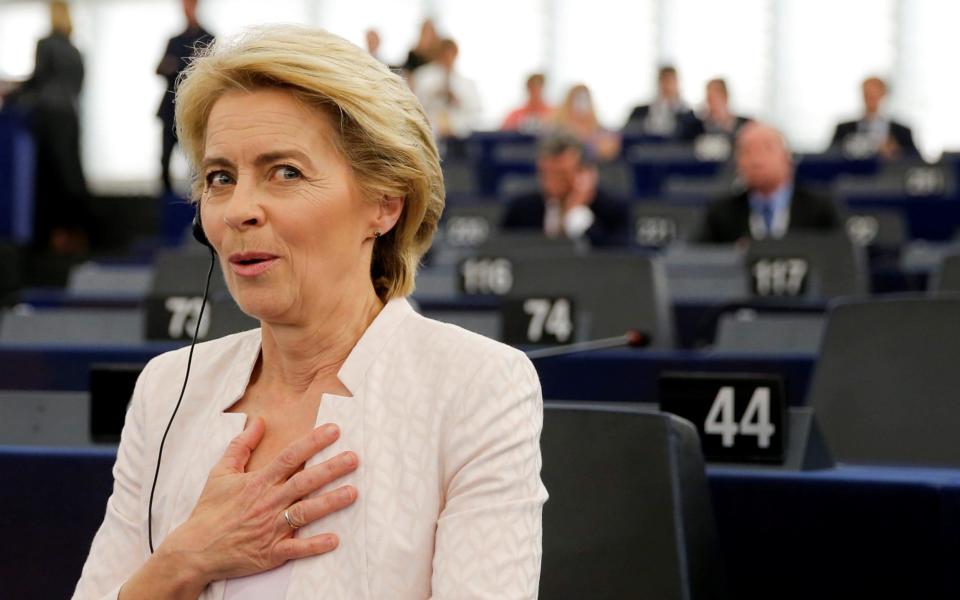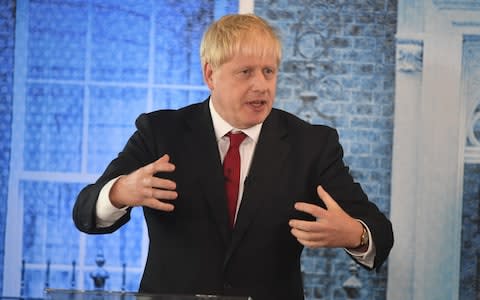New European Commission president open to Brexit extension but won't renegotiate the deal

Ursula von der Leyen, who was confirmed as the first woman president of the European Commission in Strasbourg on Tuesday, said she would support a Brexit extension but warned the Withdrawal Agreement would not be renegotiated.
The election of Mrs von der Leyen by the European Parliament came as Boris Johnson sent tremors through Westminster by significantly hardening his Brexit demands by rejecting either a time-limit or a unilateral exit mechanism to the Irish backstop as insufficient to satisfy MPs.
Mr Johnson's apparent rejection of either compromise proposal was seen as a significant hardening of the line, since these were the two concessions that prominent Brexiteers had demanded earlier this year as the price of their support for Mrs May's deal.
Mr Johnson has insisted Britain must leave, with or without a deal, on the October 31 Brexit deadline.
Mrs von der Leyen, 60, said that guaranteeing “peace and stability on the island of Ireland” and citizens’ rights were her Brexit priorities, echoing the EU’s long held insistence that the divorce treaty would never be renegotiated.
Mrs von der Leyen, who will lead the commission for the next five years, said, “The Withdrawal Agreement concluded with the government of the United Kingdom provides certainty where Brexit created uncertainty.”
“However, I stand ready for a further extension of the withdrawal date, should more time be required for a good reason,” the former German Defence Minister added to catcalls from Brexit Party MEPs in the chamber.
Privately some senior EU diplomats have not dismissed reopening the deal if they turned the key on an orderly divorce deal with Irish government consent.
In Brussels EU officials and diplomats said they were reserving judgment but are now increasingly braced for a 'no deal' at the Halloween deadline.
"Boris Johnson has been many things to many people so let’s wait and see," said one EU diplomat close to the Brexit process, "but this isn’t promising at all."
A meeting between Stephen Barclay, the Brexit Secretary, and Michel Barnier last week ended in deep divisions after the Brexit Secretary told the EU’s chief negotiator the Withdrawal Agreement was dead five times and that the backstop must be scrapped.

In Strasbourg, Nigel Farage, the Brexit Party leader, accused Mrs von der Leyen of wanting to build “a centralised, undemocratic, updated form of communism where nation state parliaments will cease to have any relevance at all.”
“I think we can probably do without what you have to say here,” Mrs von der Leyen, a mother of seven, told Mr Farage before declaring that the challenges of the modern world were so large no country could face them alone.
The European Parliament backed Mrs von der Leyen’s candidacy, despite MEPs being furious that EU leaders had nominated her after three summits and marathon negotiations, rather than any of the lead candidates who ran for the post in the European elections.
Mrs von der Leyen narrowly secured the majority vote in the parliament of 374 votes by nine votes. 383 MEPs voted for her, 327 against, while 22 abstained and one vote was void.
Her victory ended weeks of speculation that the European Parliament could reject her, as it vowed to do with anyone appointed to the job without running in the May’s elections in a 2017 resolution.
After her tight victory, she was asked if she would rather deal with Mr Johnson or his rival Jeremy Hunt. "I don't know either of them personally, she said, "I will work in a very constructive way with every head of state and government."
Martin Selmayr, the German controversial secretary general of the commission, announced he would resign in accordance with Brussels tradition that dictates no two people of the same nationality can hold the EU’s executive’s most powerful posts.
Mrs von der Leyen, overcame opposition from the Greens, some Socialists and the far-right after a 30 minute speech in which she dared MEPs to reject the first woman nominated for the commission presidency in the secret ballot.
She vowed to ensure “full gender equality” among her incoming commissioners, who are nominated by national governments. She will take up her post on November 1, a day after the Brexit deadline.
“We represent half of our population. We want our fair share,” she said.
The outgoing Juncker Commission had 19 male and just nine female commissioners, despite Jean-Claude Juncker begging national governments to send women to Brussels. Since 1958 there have been 183 commissioners but only 35 have been women.
Mrs von der Leyen, a close ally of Angela Merkel with a patchy record as Germany’s defence minister, said she would propose adding violence against women to the list of crimes defined in the EU’s Treaty.
She also promised a “Green Deal” aimed at making Europe carbon neutral by 2050, a mandatory minimum wage across the EU and plans to make tech giants pay a fair share of tax.


 Yahoo News
Yahoo News 